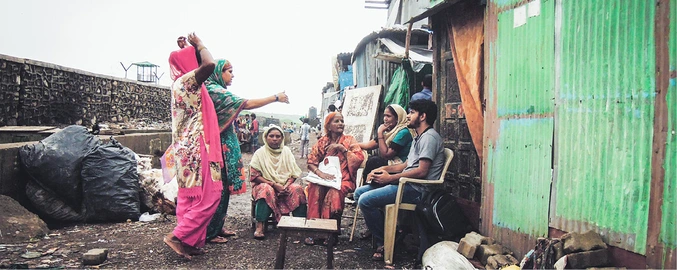From encroachment to citizenship: Self-organization and mobilization of slum dwellers in Mumbai
September 15, 2020.
In the informal settlements of Mumbai, people deemed to be evicted are getting self-organized and mobilized to create a place for themselves within the city.Most of the slums in Mumbai were built on waste. Mumbai is an island city and waste has been used for land reclamation, for connecting different islands, and to expand the city at its edges. By dumping waste over the mangroves, the marshy land turned into housing construction sites. One percent of Mumbai's population engages with waste to earn a living, whereas many use waste materials for construction, for storing water, and in other ways in their daily lives.
Spill-over effect of waste
Waste from the dumping grounds is spilling over the city, releasing methane which causes frequent fires with smoke spreading all over the city. Those who aspire for a planned world-class city, who consider waste as something that should be out of sight and mind, demand to fight the unplanned and unscripted, and to move the dumping grounds far from the city. As a result, settlements near the dumping sites have been demolished on the premise of fire outbreaks and residents have been arrested as suspects of arson. People living on and engaged in recycling these heaps of waste feel threatened. Because they have unlawfully built their houses on municipal lands, city officials call them encroachers and can evict them at any given time.
Case of Sanjay Nagar II
The houses of the residents of Sanjay Nagar II, a settlement near Deonar dumping ground, have been demolished multiple times yet have always been rebuilt. The residents’ claim to “the right to the city” is a radical position vis-à-vis the current regime of exclusionary citizenship. The people of Sanjay Nagar II argue for an expanded perception of citizenship. To assert such claims, they associate themselves with people living in other settlements in Mumbai with the same informal status, and people who were dispossessed from their agricultural lands due to infrastructure projects. They created a community based on their common experience, which is their confrontation with those who do not acknowledge them as citizens. This is a breeding ground for politics, because those who have no rights are acting as if they have. As a collective, these activist citizens of Mumbai push an alternate development paradigm: One which opposes the existing model of urban planning through dispossession, and emphasizes the establishment of a just city.
People-made space for themselves
Their placemaking through collective resistance against evictions resulted in a shift in identities and social relations. The people of Sanjay Nagar II negotiated a place for themselves in the city through politics. But the remaking of Sanjay Nagar II happened outside the city’s official urban planning and development programs. It is not just a change in the built environment but has a deeper meaning in terms of human experience. Whereas before they were branded as informal, unplanned, illegal, dilapidated and unwanted, they have now become something that cannot be categorized in common notions of formal-informal and legal-illegal. They have changed a world of duality and contestation into a world of possibilities for organizing and building cities; and in doing so have shown that this is not just the job of urban planners and policy makers.
This article is from ZEFnews 41. To read the whole issue see https://www.zef.de/fileadmin/user_upload/ZEFnews_No_41_Webversion.pdf



